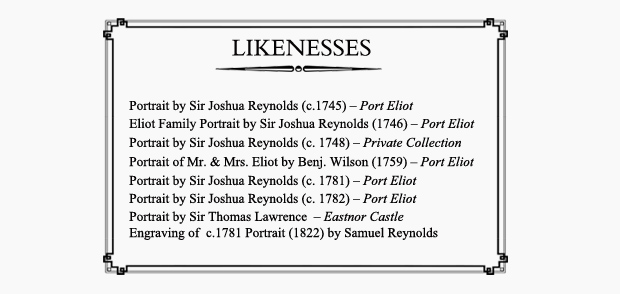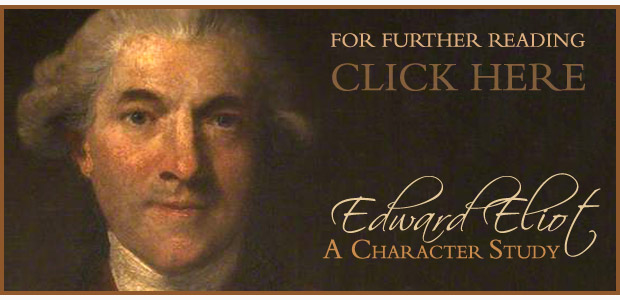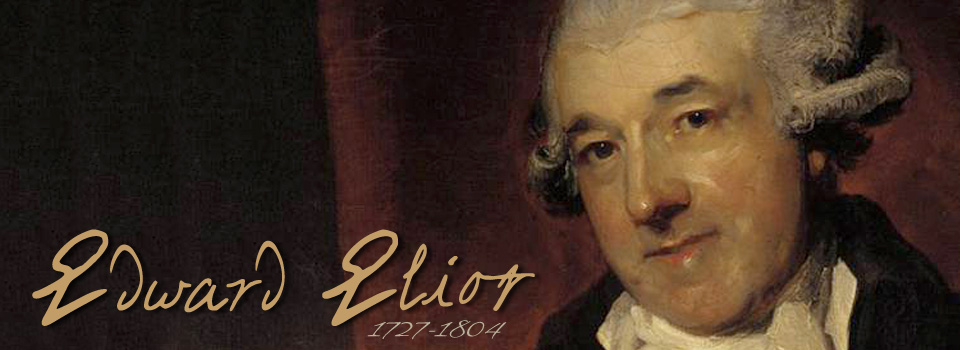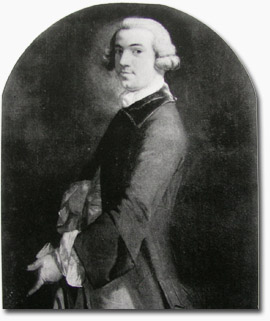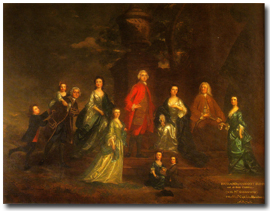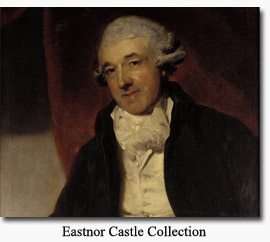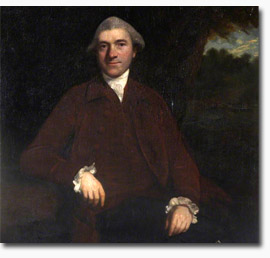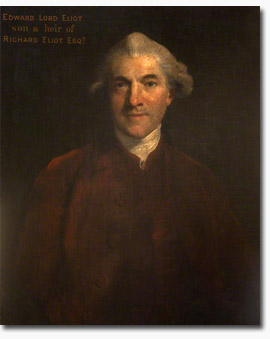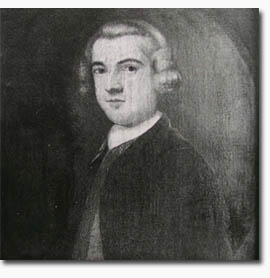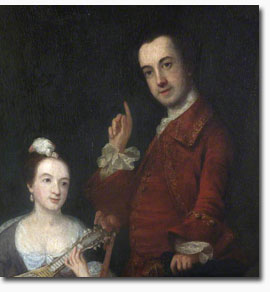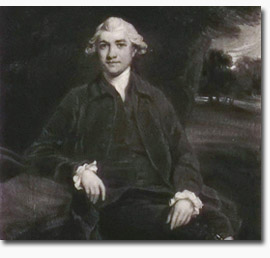Edward Craggs Eliot, 1st Lord Eliot (1727 - 1804)
Edward was the first son and first child of Richard Eliot and Harriot Craggs, known to family and friends as Ned.
Harriot Craggs meticulously recorded the births and baptisms of her children in the family Bible. Interestingly enough, Edward, unlike his siblings, was not born in the Cornwall that he loved but in London – on 08 Jul 1727, at four o'clock in the morning – and was baptised at St. George's Hanover Square a week later. All that is known about his childhood is that his early education was completed at Liskeard Grammar School in Cornwall, before he entered St. Mary Hall at Oxford in 1742.
Richard Eliot sent his oldest son, Edward, to Europe for an extended period of study. The "Grand Tour" was quite fashionable at the time, and Edward was anxious to improve his knowledge of the German and French languages and his "society manners". In the middle of August 1746, Edward set out for London, accompanied by his mother, to bid goodbye to friends and family. He received many parting gifts "but no money from any except 20 Guineas" from his aunt, and his ship sailed for the Continent during the week of August 21st. This prolonged absence resulted in quite a few letters passing between Edward and the family at Port Eliot, from which it has been possible to glean most of the family and estate details of the period. (Remarkably, Edward saved many of his family's letters to him and brought them back to Port Eliot. It's unusual to find both sides of written "conversations" preserved and is a treat for any researcher.)
Walter Harte, a tutor from Oxford University, had been hired in 1745 to accompany Philip, Lord Stanhope (the natural son of the Earl of Chesterfield, who was a close friend of the Eliots) on his "Grand Tour". Edward joined the two of them a year later, and the three made their way across Europe together. (The Earl of Chesterfield wrote his famous "Letters to His Son" during these years, and Eliot is favourably mentioned throughout.) Father and son wrote often, while Edward continued to struggle with the German language and the fact that he would never be proficient at dancing.
In March 1748, Edward's father, nearing the end of his short life, sent a letter to his son, stating that it was absolutely necessary that Edward "should be in England from the latter end of July to the middle of October to settle our family affairs, for the general good of all of us, by preventing Port Eliot Estate to another family, whilst we have heirs of our own descended from us". Edward quickly travelled home to Port Eliot, to set out for London with his father and "a large box of papers of the greatest Consequence" to the estate. Since Richard Eliot left no will (only an Admonition filed in 1749), father and son must have settled all necessary business between them – and with only days to spare. Richard never saw Port Eliot again, his death taking place in London on 19 Nov 1748. Edward made the return trip to Cornwall, with the "large box of papers", to take his place as new head of the family and owner of a struggling estate.
At the age of twenty-one, Edward inherited a large estate with a £7,000 deficit and lacking sufficient funds to even support itself, his father having died "insolvent and in debt". While Edward by no means led an impoverished life, his parsimonious nature served him well as he struggled to change this situation. In three years, he managed to pay off his father's debts, but it left resources for little more. As the years passed, an advantageous marriage and two large inheritances, added to his brilliant estate management and prudent investments, enabled Edward to channel funds into church repairs, building renovation, grounds expansion, and purchase of additional properties. It is to Edward's serious application to estate improvement (ably continued by his son, John) that the Eliot family would owe the larger portion of their physical and financial comfort for two centuries to follow.
The early period of Edward's life was not only frought with financial difficulties, but he suffered from quite a few serious health issues, as well. In the early months of 1750, Edward underwent two serious operations of some kind, though he was sufficiently better by May of the same year for his friends to be assured of his full recovery. In May of 1752, he fell from his horse and broke his leg, in order to avoid two small children in the road. Yet another ailment was affecting Edward's health the following year, resulting in his having to spend time in Naples to recuperate. This undisclosed illness was serious enough to prevent him from attending the opening of the Parliamentary session in October 1755. Having set out with the intent of making it there in time (travelling with his friend, Anthony Champion), Edward was forced to send Champion on alone, writing that the effort of the journey had "brought back a return of my spitting of blood". The following year found Eliot sufficiently recovered from his illness to return to London and Catherine Elliston.
Before Edward's trip to Italy in 1753, Edward Gibbon (father of the historian) had suggested a match between his niece, Catherine Elliston, and Edward. Eliot tradition would have Edward choose a girl with a large fortune, and Miss Elliston – as only daughter and heiress of a wealthy merchant – suited Edward just fine. It was three years before Edward was well enough to embark on the proverbial ship of matrimonial bliss, but 22 Sep 1756 was settled on as the perfect day for a trip to St. James' Church in Westminster. The pair were "lovely and pleasant in their lives", and their union was blessed with four sons (three of whom lived to adulthood).
With the Eliot coffers swollen by the new Mrs. Eliot's fortune (amounting to more than £60,000, making her the wealthiest-known Eliot bride ever), work at home began in earnest. According to his great-grandson (William Gordon, 4th Earl of St. Germans), Edward "built the Round Room and Dining Room; almost, if not entirely, rebuilt the South Front of the House; banked back the river on the north side of Port Eliot, thus forming the lawn; and built a music room (which was pulled down in 1829 to make way for the offices). He also materially altered the Church and Churchyard, obtaining a Faculty for the erection of the Port Eliot Pew" and the removal of the ancient churchyard located just outside his dining-room window. Somewhere between 1780 and 1785, Edward donated a piece of land for a new cemetery (now referred to as the "Old Cemetery" of St. Germans), about a quarter of a mile down the road, built a new Eliot family vault in the side of the hill, then paid to have the older graves and headstones moved from the churchyard to the new burial ground.
Edward's political career was not outstanding, but he certainly supported a good many outstanding men and well-known movements (including governmental reform and the anti-slave-trade bill). On the death of his father, Edward became M.P. for St. Germans (occupying that family seat for the next twenty years) and succeeded to the position of Receiver General of the Duchy of Cornwall (a post which he kept for almost fifty-four years). From 1759 to 1776, he served as Lord of Trade, through which position he was able to further the career of his younger brother, Captain John Eliot. Shelburne actually recommended Edward to the King in 1782, writing, "He looks to peerage. He returns seven Members of Parliament, has a very great fortune, and uncommon personal weight in Cornwall, where the King wants an able person of influence; would humbly recommend him to your Majesty's remembrance when peers are made." Of course, not all were ready to "recommend" Edward Eliot to the King. As is the case with any "able person of influence" of "uncommon personal weight" in his native district, Edward made his share of political enemies (e.g., Lord North and his wife's cousin, Edward Gibbon).
Edward Eliot was created 1st Baron Eliot (commonly called 1st Lord Eliot) – making him the first member of the family to be raised to the Peerage – and took a seat in the House of Lords on 02 Feb 1784. This honour was entirely due to his son's close friendship with William Pitt, the very young and very new Prime Minister. One of Pitt's first acts as P.M. was to raise some well-chosen M.P.s to the Peerage, in an effort to secure his strength and position. Each man controlled multiple seats in Parliament and was (or suddenly became) a staunch Pitt supporter. Edward Eliot was both, he and all three of his sons remaining fervent Pitt followers throughout their lives.
Edward had a number of renowned friends and acquaintances in both Cornwall and London. He was a member of the Literary Club and a close friend of Sir Joshua Reynolds (even acting as Pallbearer at the artist's funeral in 1792). Several of Edward's sayings were recorded by Boswell, and he was on friendly terms with Dr. Johnson. Eliot's great-grandson wrote that Edward "got Dr. Johnson to drink a Cornish mixture called ‘Mahogany', but with slight success. He first mentioned to Dr. Johnson the work, said to be by Defoe, ‘Memoirs of Captain Carleton'. The Doctor said, on this occasion, pleasantly alluding to his friend's then new Peerage, that he did not think a young peer could have mentioned to him any English book with which he was unacquainted."
This 1st Lord Eliot exemplified the true "Country Squire" character. He loved the country life and – although he had a house and many friends in London – did not like to live in town. He enjoyed riding, reading and was very keen on "antiquities", spending much of his spare time studying and digging (literally) around the environs of his estate and the nearby Church. What he loved most, though, was working on Port Eliot and planning/supervising the improvements on the estate in general. The older he got, the less Edward liked to attend Court functions. In fact, on 11 Mar 1803, the "Morning Post" reported that "Lord Eliot, of Port Eliot, was at the Drawing-room, for the first time these ten years."
Throughout his later years, Edward suffered from regular attacks of the "Eliot malady". This malady plagued many (perhaps all) of the 18th-century Eliot men and women. The family referred to it as a simple "attack", an "affectation of the stomach" and several other similar names. For Edward, it manifested itself as a fever , a "gouty" attack, or an "ailment". Regardless of the medical origin of the illness, it cannot have helped that the family lived with the River Tiddy lapping at the walls of their house and a very full and active burial ground just outside the dining-room window. In fact, with Edward's work on the property – including the banking of the river side of the house and removal of the graveyard – the Eliot malady disappeared from family mention.
On 17 Feb 1804, at the age of 76, Lord Eliot died at Port Eliot "after a short illness". His wife died six days later of an inflammation of the chest, and they were buried together on the first day of March (the first burials in the new family vault in the "new" St. Germans Cemetery). A deteriorating stone plaque on the vault marks their final resting place, but a nice brass memorial can be seen in the North Transept of St. German's Church, which reads as follows:
In Memory of Edward Craggs, First Lord Eliot,
Who Died on the Eighteenth [sic] Day of February
In the Year of Our Lord 1804. Aged 76 Years: And of
Catherine His Wife, Who Died on the Twenty-Third
Day of the Same Month, Aged 68 Years.
They were Lovely and Pleasant in Their Lives,
and in Their Death They Were Not Divided.
